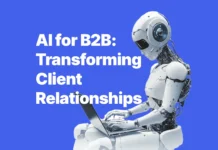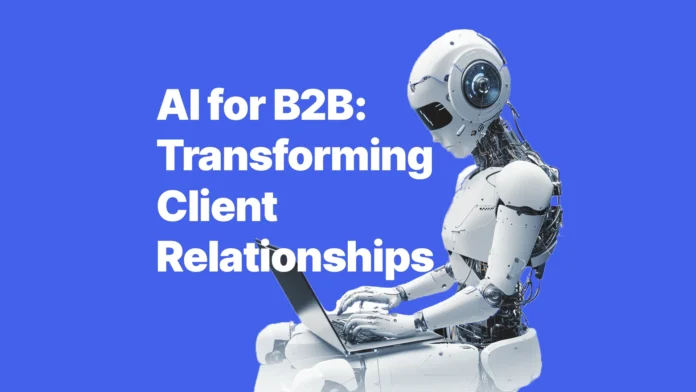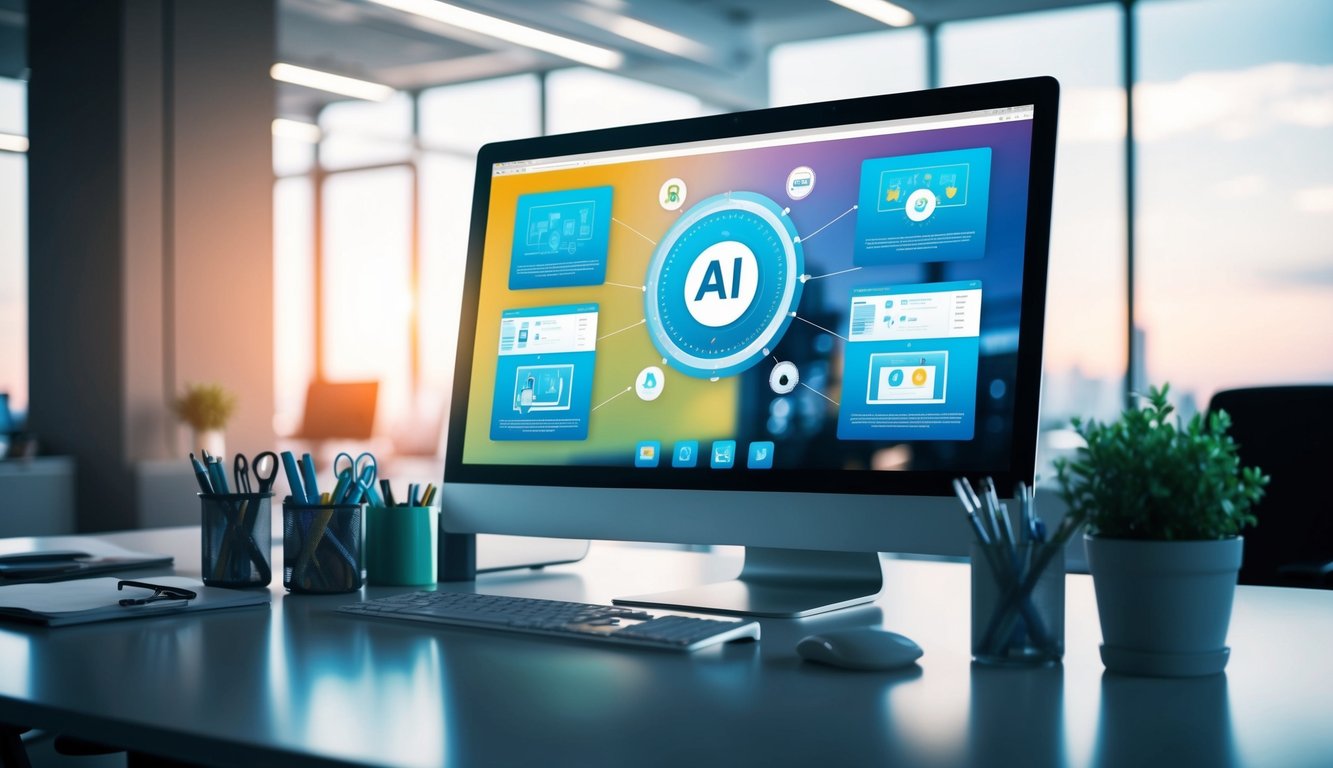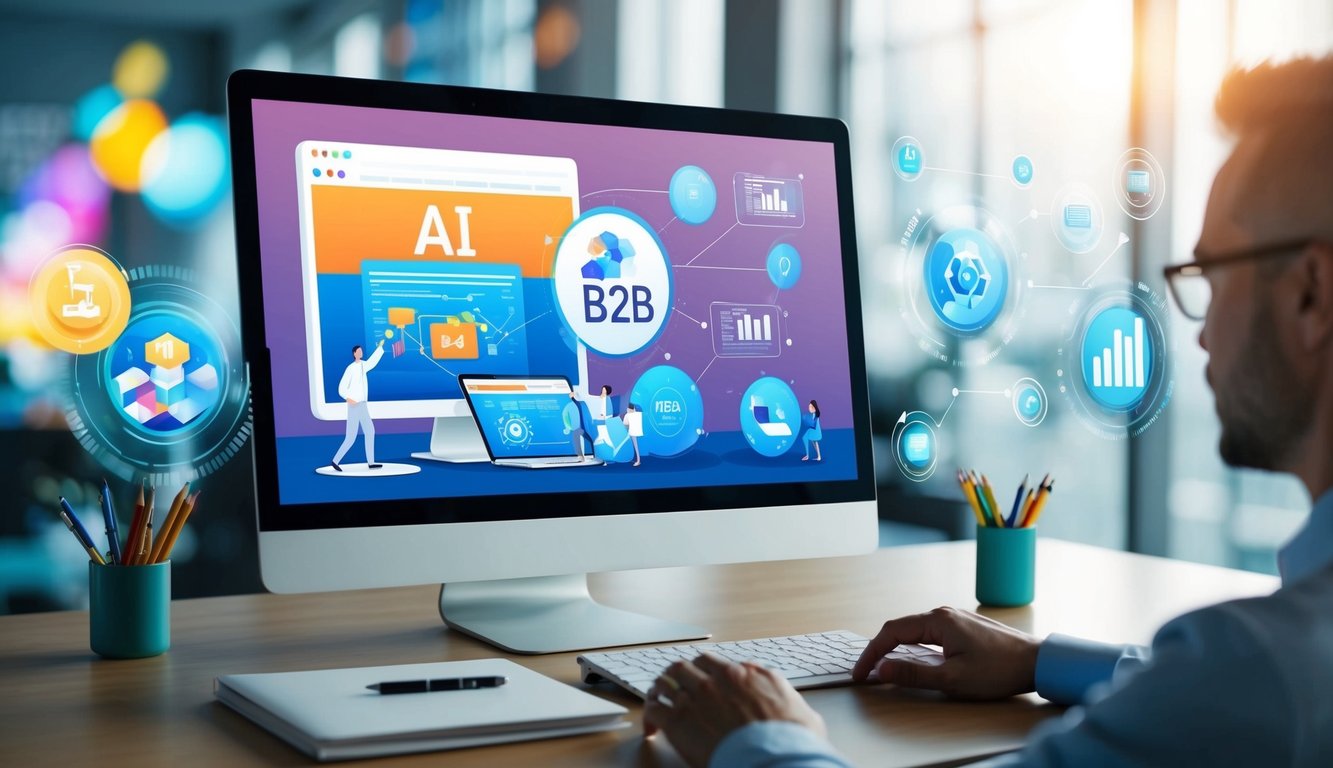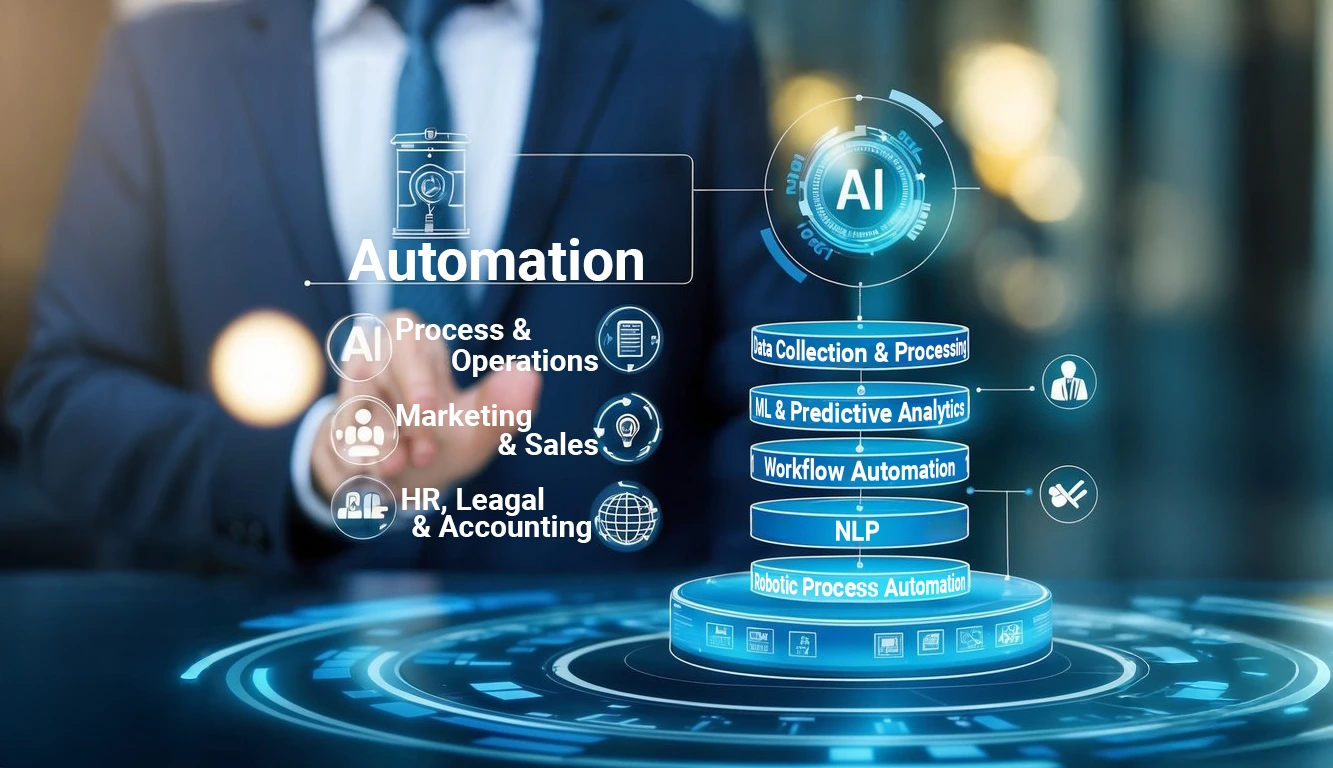Artificial Intelligence is revolutionizing business-to-business interactions at an incredible pace. The transformation is so profound that it’s reshaping how companies operate, market, and sell. AI has the potential to streamline operations, improve decision-making, and ultimately boost sales and profitability. Reflecting on my personal experiences, integrating AI tools in the sales process has not only improved efficiency but significantly enhanced customer engagement.
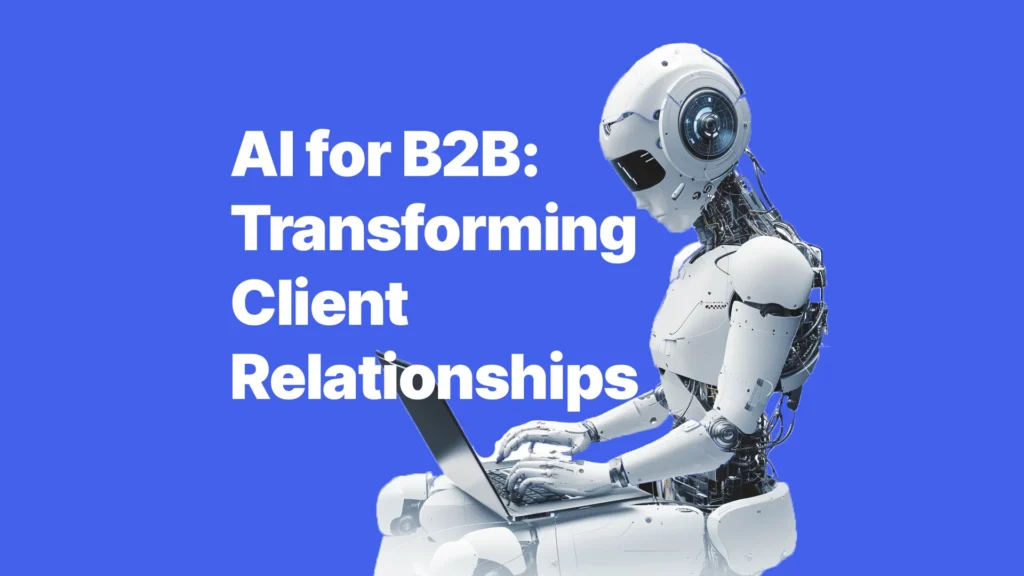
Navigating the B2B landscape with AI can be compared to driving a car with advanced features that make every journey smoother and more efficient. For instance, marketing automation and personalization have become key elements, enabling businesses to tailor experiences for different client segments, which, in my experience, has made customers feel valued and understood. It’s like having a little humor in your business strategy—unexpected but effective.
The promise AI holds for improving customer support and operational efficiency is equally exciting. Imagine answering customer inquiries swiftly or predicting market trends before they materialize. It’s akin to having a conversation where you know just when to drop the punchline for maximum effect. With the right AI resources, it’s possible to achieve remarkable operational improvements that benefit both the company and its clients.
Key Takeaways
- AI enhances B2B operations and customer engagement.
- Personalized marketing and automation drive customer satisfaction.
- AI tools improve efficiency and strategic planning.
Foundations of AI in the B2B Landscape

The integration of artificial intelligence in the B2B sector forms a crucial part of modern business strategies. As businesses strive for scalability and enhanced marketing capabilities, AI adoption becomes critical for competitive success.
Understanding AI and Its Role in B2B
Artificial intelligence has revolutionized how B2B enterprises operate, much like how a personal assistant revolutionizes your daily routine. AI tools support decision-making processes by analyzing vast amounts of data quickly and accurately. In B2B marketing, AI enhances customer interactions by personalizing content and predicting potential leads through machine learning algorithms. Considering the critical role AI plays, its capabilities extend to automating repetitive tasks, freeing up valuable time for strategic decision-making.
In the B2B context, AI’s possibilities are vast, from optimizing supply chains to forecasting sales trends. I remember when I first introduced AI into a project; the ability to make data-driven decisions felt empowering. The transformation it brings to analytics and operations aligns perfectly with businesses aiming for scalability.
AI Adoption in B2B Enterprises
Adopting AI in B2B enterprises requires careful planning and alignment with business goals. Implementing AI technology isn’t just about technology gain; it’s about restructuring processes and embracing change. In my experience, the successful deployment of AI depends on a clear understanding of its role and potential benefits.
A major aspect of AI adoption in B2B involves addressing various challenges such as budget constraints and staff training. It’s similar to buying a high-tech coffee machine—you’ve got to know how to use it to enjoy the perfect brew. With frameworks like the Technology Acceptance Model, AI adoption can be streamlined, ensuring the strategic and operational benefits are fully leveraged.
Enhancing B2B Sales with AI

I’ve often found myself amazed at how artificial intelligence transforms B2B sales by boosting efficiency and enhancing accuracy. Whether it’s refining lead scoring, optimizing sales processes, or diving deep into customer data, AI provides tools and insights that revolutionize how we can engage with clients.
AI-Driven Lead Scoring and Qualification
In my experience, AI streamlines lead scoring by analyzing vast sets of data to identify the most promising prospects. This allows me to focus my energy on leads more likely to convert. AI tools assess criteria such as past interactions, firmographics, and digital footprints.
I use these insights to prioritize leads effectively. One day I might focus on prospects showing high engagement on social media. The next, it could be companies that exhibit similar behaviors to previous successful clients. The predictive analytics aspect of AI provides a nuanced understanding, helping me pinpoint quality leads faster.
Optimizing the Sales Process with AI Tools
AI tools optimize my sales process by automating repetitive tasks. This automation frees up time to concentrate on what’s essential: building relationships. For instance, CRM systems powered by AI automatically update contact information and schedule follow-ups, reducing administrative burdens.
I remember when I first integrated an AI scheduling tool. Suddenly, coordinating meetings became seamless. With AI suggesting the best times to connect based on past interactions, it became almost a game to outsmart the AI in sneaking in a last-minute meeting change. The overall efficiency improvements have been striking.
Leveraging AI for Customer Data Analysis
Analyzing customer data with AI provides a depth of insight I could never achieve alone. By examining buying patterns and preferences, AI tools offer strategies to tailor my sales pitches.
Imagine this: I once used AI analytics to discover that a particular client preferred email communication on Tuesdays. By aligning my outreach with this preference, my engagement soared. These insights allow me to customize interactions, increasing the likelihood of a sale. AI transforms mountains of complex data into actionable steps, paving the way for more informed decision-making in my B2B interactions.
Marketing Automation and Personalization

When discussing marketing automation and personalization in the B2B sector, it’s important to look closely at how AI enables personalized experiences and targeted strategies. These elements are crucial for enhancing customer engagement and driving business growth.
Targeting and Personalization in B2B Marketing
In B2B marketing, targeting and personalization can significantly enhance the customer experience. By leveraging AI-driven personalization, I see how companies capture specific customer preferences and behaviors. This involves analyzing large datasets to tailor marketing efforts more effectively, which creates a unique customer journey.
Using AI, businesses can segment their audience into niche groups. This segmentation ensures that each customer’s interaction with the brand feels personal and relevant. It reminds me of my experiences where personalized interactions made me feel more valued as a customer.
Conversational Marketing and Engagement
Conversational marketing is an exciting aspect, as it engages customers directly through AI-driven chatbots and messaging platforms. I remember the first time I interacted with a customer support chatbot that resolved my inquiries instantaneously. Such seamless interactions are now crucial for customer experience.
AI tools facilitate real-time conversations with prospects and customers, ensuring their needs are met promptly. This immediacy enhances the overall customer journey, creating a bond between the business and customer. The improved response time and personalized interactions often lead to higher engagement rates, which can drive further conversions.
Account-Based Marketing with AI
Account-based marketing (ABM) focuses on targeting specific accounts rather than a wide audience. With AI, ABM becomes more precise and efficient. AI technologies can evaluate potential accounts and customize marketing efforts to meet their specific needs.
When employing ABM strategies, businesses can use data to craft tailored marketing campaigns for individual accounts. This method has proven to improve return on investment by ensuring marketing resources are directed toward high-value targets. I’ve seen this in action when a business I collaborated with targeted their marketing efforts on fewer accounts but achieved more success. This focused approach has enhanced investment and resulted in a more effective marketing strategy.
By embracing these AI-driven methods, companies can refine their marketing approaches, resulting in more effective B2B strategies.
Content and Advertising Transformed by AI

AI is reshaping how content is created and how advertisements are tailored to audiences. The integration of AI tools brings both precision and creativity to these domains, offering new possibilities for personalization and efficiency.
Revolutionizing Content Creation with AI
When I first encountered AI-driven content creation, I was amazed at the efficiency and creativity it brought to writing tasks. Tools like ChatGPT and other AI content writers can generate high-quality text rapidly, making it a game-changer for content marketing. AI doesn’t just save time; it allows for the production of diverse content forms, from articles to social media posts.
Generative AI analyzes vast amounts of data to craft content that resonates with specific target audiences. This capability enhances user engagement, driving better results. For businesses focused on ROI, AI-driven content ensures resources are used efficiently. I once tested this by letting an AI tool draft a blog post, and later optimized it for SEO and audience engagement, achieving promising results.
Strategizing Advertising with AI Insights
In advertising, AI’s analytical strengths reveal patterns and preferences that remain hidden to the human eye. I remember working on a campaign where AI analytics provided unexpected insights, significantly boosting advertisement performance. By processing big data, AI enables marketers to create personalized ads that connect with users on an emotional level.
This strategy leads to higher conversion rates and ROI. AI helps refine audience targeting by understanding web behaviors, browsing history, and social interaction patterns. For instance, an AI tool once suggested ad placements that resonated exceptionally well with our audience, reducing ad spending while amplifying impact. The precision of AI insights takes advertising strategies to new heights, making each marketing dime count.
Improving Customer Support and Experience

When I think about improving customer support and experience in the B2B space, AI plays a crucial role. AI-powered chatbots revolutionize how businesses interact with customers, while monitoring tools help understand customer behavior and feedback.
AI Chatbots and Customer Interaction
In my experience, AI chatbots have transformed the way businesses conduct customer interactions. They are available 24/7, offering immediate responses and reducing wait times significantly. On one occasion, a chatbot even helped me resolve a technical issue in the middle of the night. This kind of around-the-clock support enhances the customer experience by providing instant solutions.
Chatbots also personalize interactions by using data to tailor responses and suggest products or services that align with a customer’s previous preferences. I remember feeling impressed when a chatbot recommended a solution based on my past inquiries. This personalization strengthens the connection between businesses and their customers, making interactions not only quicker but also more relevant.
Monitoring Customer Behavior and Feedback
Understanding customer behavior is like having a map to navigate client needs. AI tools monitor patterns and feedback to provide insights into what clients want or dislike. I once used feedback monitoring to identify a recurring issue clients faced with a specific product feature.
This data-driven approach allows companies to adjust strategies proactively, enhancing the customer support experience. By analyzing behavior and feedback, businesses can address problems before they escalate, improving satisfaction and loyalty. I appreciate how timely interventions based on feedback have resolved issues before affecting my business relationships.
Identifying trends in customer behavior also helps in tailoring marketing strategies, ensuring communication is aligned with customer expectations. Monitoring ensures businesses stay one step ahead, adapting to evolving client needs and preferences.
Data and Analytics in the AI Era

In today’s AI-driven landscape, the transformation of data into actionable insights is a key focus for B2B enterprises. As we explore the evolving dynamics of data analytics, it becomes evident how critical predictive analytics and data collection are in shaping intelligent business decisions.
Evolving Role of Data Analytics in B2B
Data analytics has taken center stage in the B2B sector. With the increasing volume of digital data, businesses must leverage advanced tools to process and interpret this information efficiently. I recall a time when sorting through endless spreadsheets felt like deciphering an ancient script, but now, the stories hidden in the data are much clearer.
Predictive analytics has significantly impacted decision-making processes. By analyzing past trends, businesses can forecast future demands and tailor their strategies accordingly. This ability to anticipate market shifts can be a game changer.
Moreover, analytics doesn’t just stop at predictions. It influences customer interactions, enhancing personalization and improving overall customer experience. It’s fascinating to watch as AI tools adapt, making analytics more accessible and intuitive for non-experts. Gone are the days when only a data scientist could interpret complex datasets.
From Data Collection to Actionable Insights
The journey from data collection to achieving actionable insights is multi-faceted. Initially, raw data must be collected through various channels, ranging from social media interactions to customer transaction records. I remember when collecting customer feedback involved tedious manual surveys—how times have changed!
Once data is gathered, the real magic lies in transforming it. AI’s role here is undeniable, employing algorithms to process data, identify patterns, and highlight anomalies. Have you ever been amazed by how Netflix knows exactly what you want to watch next? That’s smart data utilization right there.
Finally, businesses must act on these insights. Knowing that 30% of customers abandon the checkout process is only useful if followed by specific improvements in the shopping experience. Insights become actionable when they directly inform business strategies, such as optimizing marketing campaigns or streamlining operations. This process highlights the pivotal role of data analytics in achieving business objectives.
Operational Efficiency and Productivity

I’ve always been fascinated by how artificial intelligence (AI) transforms the way businesses operate. Integrating AI into B2B contexts improves both operational efficiency and overall productivity by streamlining processes and enhancing workflow through automation.
Streamlining Operations with Automation
When I first explored incorporating automation into business processes, I was amazed by the sheer potential it held for efficiency. AI-driven automation reduces repetitive tasks, allowing teams to focus on strategic activities. Technologies like machine learning and robotics process automation help eliminate human error, reducing time-consuming manual work.
One company I worked with replaced their manual data entry with an AI system. This change improved data accuracy and saved hours each week. This transformation not only cut costs but also improved team morale as employees shifted to more engaging responsibilities. The power of automation, above all, lies in creating a seamless workflow that adapts to changing business needs.
Boosting Productivity through AI Integration
On my journey, I’ve seen how integrating AI can dramatically boost productivity. AI tools in customer relationship management systems can predict customer needs, enabling businesses to stay ahead. These predictions allow teams to make data-driven decisions quickly, supporting rapid business growth.
One memorable example was a small firm that used AI tools to analyze sales data. This analysis helped them identify trends and adjust their marketing strategies, resulting in increased sales. AI integration streamlines data processing and enhances decision-making capabilities. Ultimately, AI empowers teams by providing them with valuable insights and freeing up time for strategic initiatives.
AI in B2B Strategy and Corporate Planning

AI is transforming the way businesses approach strategy and planning. From reshaping sales strategies to enhancing product development, AI offers powerful tools to gain competitive advantages and drive success.
Developing AI-Infused Sales Strategies
When I first explored how AI could impact our sales strategies, it felt like opening a box of possibilities. AI can analyze vast amounts of customer data, uncovering patterns that might have gone unnoticed otherwise. With these insights, businesses can refine their sales strategy to perfectly match customer preferences and behaviors. For instance, AI-driven analytics can pinpoint which products are most likely to interest different segments, leading to tailored marketing strategies and increased conversion rates. Additionally, by using AI to forecast trends, we can anticipate market shifts and adjust our tactics accordingly. It’s like having a predictive guide to navigate the market maze.
Incorporating AI into Product Development
Incorporating AI into product development was a game-changer for me, providing a completely new perspective on innovation. AI tools can simulate various product scenarios before they even hit the market. This kind of predictive analysis helps designers and engineers refine their creations while reducing development time and limiting costly errors. With AI, I can analyze data from existing products, customer feedback, and even competitor offerings to identify areas of improvement or entirely new opportunities. Integrating AI-based tools helps create products that are not only technologically advanced but also closely aligned with customer needs and preferences, providing a strong competitive edge.
The Future of AI in B2B Marketing

As AI continues to evolve in B2B marketing, I see exciting trends and challenges that shape how businesses interact. The interplay between emerging technologies and job roles makes it an intriguing area.
Emerging Trends and Predictions
In my experience, machine learning is proving to be a game-changer by streamlining data analysis for B2B marketers. It predicts buyer behavior, personalizes content, and enhances customer experiences. AI-powered chatbots are already handling customer inquiries efficiently, reducing response times and managing routine tasks.
I think natural language processing (NLP) tools are improving, allowing for nuanced sentiment analysis and deeper customer insights. AI-based CRMs offer significant data management transformations, aligning marketing strategies with real-time analytics. To me, adopting AI tools will be crucial, as businesses seek ways to leverage automation and optimization.
Job Security and Human-AI Collaboration
When people talk to me about their concerns, job security is often a significant topic. Automation may reshape some roles, but I believe there’s potential for new opportunities. Decision-making is less prone to human error with AI’s role in data processing. However, creative thinking and strategic planning are uniquely human skills that machines can’t replace.
In my opinion, B2B marketers will need to adapt, learning how to collaborate with AI systems effectively. Human-AI collaboration is the future, combining analytical power and human intuition for optimal results. I often joke about AI as my “assistant,” but the truth is, working together can enhance productivity and innovation in exciting ways.
AI Tools and Resources for B2B

Exploring AI tools for B2B can transform the way professionals operate, offering innovative platforms and enhancing marketing strategies. From essential platforms to SEO and marketing tools, these resources can revolutionize how businesses approach their B2B interactions.
Essential AI Platforms for B2B Professionals
When I think about AI in B2B, platforms like LinkedIn immediately come to mind. It’s not just for networking anymore; AI integration improves lead generation by analyzing interaction patterns and suggesting connections. LinkedIn’s deep data capabilities can provide insights that I find invaluable.
Slack isn’t just a chat app. Its AI-driven integrations allow for workflow automation, helping teams manage projects without dropping the ball. My favorite part is how AI tools within Slack streamline communication, making it possible to effortlessly coordinate resources.
For video communication, Loom offers an AI-powered platform that enhances asynchronous communication. I can record, share, and get feedback on videos, all tailored to the business environment. This tool provides metrics and viewer engagement analytics, ensuring clear and concise messaging.
AI-Powered SEO and Marketing Tools
In B2B marketing, AI-driven SEO tools stand out. Whether it’s analyzing keywords or understanding search trends, platforms like Google’s AI tools provide the edge needed in today’s market. Google’s machine learning algorithms help predict patterns that guide my content strategy more effectively.
I also rely on AI-powered marketing platforms to deliver tailor-made campaigns. Automation in these tools simplifies tasks, enabling me to focus on the creative aspects. Data analysis features ensure that marketing efforts hit the target audience precisely, without wasting resources.
AI tools like SEMrush offer invaluable insights with its SEO arsenal. With keyword research and competitive analysis, it highlights opportunities that I might have overlooked otherwise. SEO experts often leverage these insights to refine their strategies and enhance their reach.
Case Studies and Success Stories

In the world of B2B, AI is creating opportunities for companies to revolutionize their operations and strategies. From real-world applications to the noticeable impact on growth and success, AI is reshaping how businesses approach challenges and capitalize on new possibilities.
Real-World Applications of AI in B2B
I’ve come across cases where AI optimizes B2B processes extensively. One notable application is in B2B sales, where AI-powered tools enhance lead generation by analyzing big data to predict customer behavior. This helps sales teams focus on high-potential leads.
AI also refines marketing strategies by customizing content for diverse audience segments. An example I heard involves AI sorting through customer data to craft personalized messaging, increasing engagement rates. This hands-on approach not only saves time but also boosts ROI. Importantly, AI-driven platforms allow scalability by automating repetitive tasks, enabling businesses to grow without proportionally increasing resources.
Impact of AI on B2B Growth and Success
AI isn’t just a fancy tool; I’ve seen it profoundly impact B2B growth. By providing insights through data analysis, companies are making informed decisions faster. This agility often leads to a competitive edge, helping businesses stay ahead in a rapidly changing market. Imagine knowing market trends before they fully unfold.
I recently read about B2B marketing where AI-driven tools were noted to improve customer journeys, enhancing satisfaction and retention. With such tools, feedback loops are accelerated, ensuring real-time adjustments to strategy. Further, AI enhances ROI by optimizing resources, ensuring every dollar spent contributes to measurable growth. This efficiency, combined with scalability, transforms businesses into nimble powerhouses, better equipped to tackle future challenges.
Frequently Asked Questions

When it comes to integrating AI into B2B marketing strategies, several questions often arise. These topics cover the advantages AI brings, its impact on customer relationships and sales cycles, the challenges faced during implementation, and examples of successful use among smaller businesses.
What are the key advantages of using AI in B2B marketing strategies?
AI provides enhanced data analysis capabilities, automating complex tasks and providing insights that were previously inaccessible. In my experience, this can lead to improved targeting and personalization, allowing me to reach the right audience with the right message. Additionally, it often results in increased efficiency and cost savings, which I certainly appreciate.
In what ways can AI tools improve customer relationship management for B2B companies?
AI tools offer predictive analytics that can forecast customer needs, making interactions more proactive. I’ve found this helpful in preemptively addressing customer concerns. Also, automated workflows streamline communication, allowing me to maintain engagement without spending hours manually managing interactions. Essentially, AI tools help me keep my customers happy by anticipating their needs.
How are B2B sales cycles impacted by the integration of AI technologies?
By utilizing AI, I can benefit from more accurate lead scoring and forecasting, reducing the time it takes to close deals. AI-driven insights help identify prospects ready to convert, allowing me to focus my efforts where they are most likely to pay off. Consequently, sales cycles often become shorter and more efficient, a change I gladly welcome.
Can AI contribute to better decision-making in B2B pricing strategies, and if so, how?
AI analyzes market trends, customer behavior, and competitor pricing, providing data-driven recommendations. This insight helps me develop competitive pricing strategies that align with market dynamics. By doing so, I can determine optimal price points that maximize profit while remaining attractive to customers.
What are some common challenges B2B companies face when implementing AI solutions?
I often encounter challenges such as insufficient data quality and integration issues with existing systems. There’s also the need for upskilling employees to understand and leverage AI technology effectively. Overcoming resistance to change can be another hurdle, but the benefits ultimately make the effort worthwhile.
What success stories are there of small to mid-sized B2B businesses effectively utilizing AI in their operations?
I’ve heard of companies utilizing AI to improve inventory management and optimize supply chain operations, resulting in reduced costs and increased efficiency. For example, a mid-sized tech firm I know adopted AI for predictive maintenance, significantly lowering downtime and extending equipment life. Their story inspires me to consider how AI can transform smaller businesses like mine.












